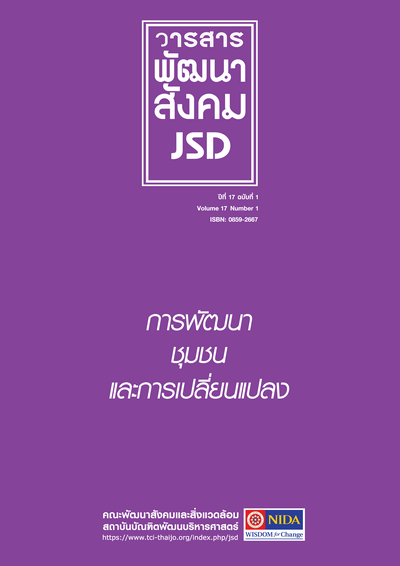การส่งเสริมการดำรงชีพอย่างยั่งยืนในชนบท ด้วยการพัฒนาบนฐานชุมชน
Main Article Content
Abstract
บทคัดย่อ
การดำรงชีพ (Livelihoods) เป็นองค์ประกอบสำคัญของวิถีชีวิตของประชากรในชุมชนชนบทไทยโดยมักจะเน้นการเกษตร การใช้ประโยชน์จากทรัพยากรธรรมชาติ และภูมิปัญญาท้องถิ่น ซึ่งอาจแตกต่างตามบริบทของแต่ละชุมชน การดำรงชีพอย่างยั่งยืนในชนบทเกี่ยวข้องกับความสามารถในการจัดการทรัพย์สินด้านต่างๆ ที่ชาวชนบทครอบครองหรือเข้าถึง เพื่อลดความเปราะบางที่ประสบและยกระดับมาตรฐานการดำเนินชีวิตของตนได้อย่างต่อเนื่องในระยะยาว ภายใต้บริบทของแต่ละพื้นที่ การศึกษานี้เป็นการวิจัยเชิงคุณภาพ มีวัตถุประสงค์เพื่อศึกษา 1) บริบทของชุมชนชนบท โดยเน้นปัญหาและความเปราะบางที่คนในชุมชนประสบ ภายใต้ภาวะของการเปลี่ยนแปลงอย่างรวดเร็ว
2) การขับเคลื่อนการพัฒนาบนฐานของชุมชน และการปรับตัวของคนในชุมชนชนบทในการดำรงชีพ
และ 3) ผลของการพัฒนาบนฐานของชุมชนในการปรับปรุงการดำรงชีพของชาวชนบทภายใต้กระแสโลกาภิวัตน์ รวมทั้งวิเคราะห์โอกาสที่จะเกิดความยั่งยืนในการดำรงชีพ จากการรวบรวมและวิเคราะห์ข้อมูลจากเอกสารที่เกี่ยวข้อง ใน 3 ชุมชนชนบท ซึ่งตั้งอยู่ในภูมิภาคต่างกันและประสบผลสำเร็จในการพัฒนาจนเป็นชุมชนเข้มแข้ง พบว่า แนวทางการพัฒนาบนฐานของชุมชนที่ให้ความสำคัญกับการมีส่วนร่วมอย่างแข็งขันของสมาชิก ช่วยส่งเสริมการดำรงชีพอย่างยั่งยืน และสอดคล้องอย่างมากกับบริบทของแต่ละชุมชน อีกทั้งยังยกระดับมาตรฐานการดำรงชีวิตให้มีความมั่นคงยิ่งขึ้น ด้วยการสร้างระบบสวัสดิการชุมชน ทั้งนี้เพราะสมาชิกชุมชนสามารถปรับปรุงการดำรงชีพ โดยยังคงอิงทรัพยากรในท้องถิ่น แต่มีการพัฒนาการผลิตสินค้าและบริการที่เกี่ยวข้องอย่างมีพลวัต โดยคนในชุมชนสามารถปรับตัวได้ดีกับสถานการณ์ที่เปลี่ยนไป ดังนั้น แนวทางการพัฒนาที่ใช้ควรส่งเสริมการปรับปรุงการดำรงชีพให้เหมาะกับบริบทของแต่ละชุมชน
คำสำคัญ: การพัฒนาฐานชุมชน การดำรงชีพ ความยั่งยืน ชนบทไทย
Abstract
Livelihood forms an important component of people’s way of life in rural communities in Thailand. It is often focused on agriculture, utilization of natural resources and local wisdom which may differ depending on community contexts. Rural sustainable livelihoods associate with abilities of rural people to manage their various assets to reduce vulnerabilities and to improve their standard of living in a long term within specific local contexts. This study is a qualitative research aiming to: 1) investigate contexts of selected rural communities by focusing on problems and vulnerabilities faced by community members in a condition of rapid change; 2) find out community-based development movements and livelihood adaptation of rural people; and 3) identify the effects of community-based development on livelihood improvement among rural people in the face of globalization as well as analyze livelihood sustainability. Findings from a documentary study in 3 successfully developed rural communities and located in different regions of the country reveal that the community-based development approach is highly suitable for enhancing livelihood improvement to solve community problems, corresponding to local contexts, leading to sustainability. Additionally, it helps to uplift and to secure the standard of living of rural community members through the creation of the community welfare system. This is possible mainly due to their ability to make their living based on local resources. Meanwhile, local good production and services are developed dynamically, and local communities can interact creatively with external markets and networks. At the same time, it also urges community members to realize the values of conserving local natural resources and to adapt themselves to changing situations affected by globalization.
Keywords: Community-based Development, Livelihood, Sustainability, Rural Thailand

